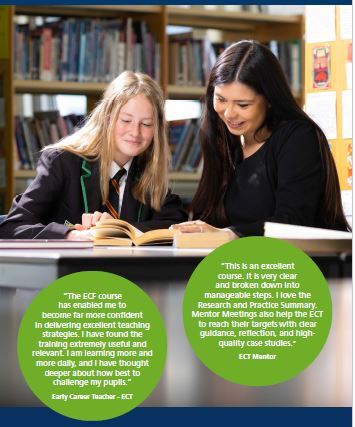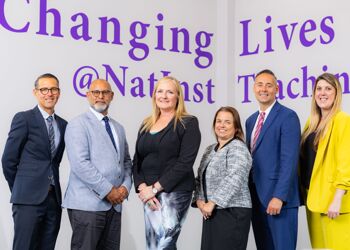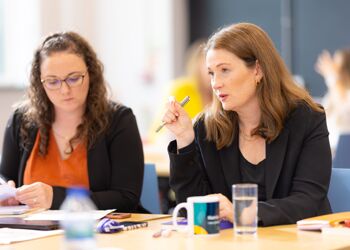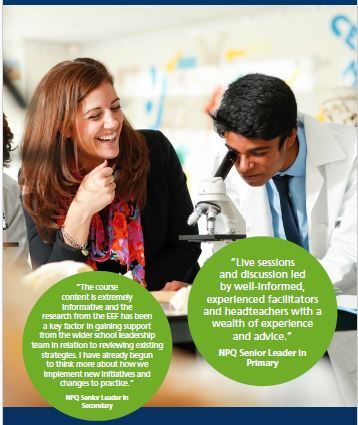- Home
- Teaching School Hubs
- Governance Structure
Governance Structure

Governors and strategic partners are involved in developing the Harris Institute TSHs long-term strategy, ensuring the hubs have both the capacity and capability to deliver on their DfE remit successfully. They are divided into the Harris Institute Governance Board and the Harris Institute Steering Committee.
Areas of impact within the strategy include:
- TSH capacity and capability per region
- TSH participant figures and evaluation for the golden thread suite of national programmes per region
- TSH school engagement figures per region
- Recruitment and retention in the local area (drawn from the Teacher Labour Market Report NFER and NEU’s retention survey) per region
- Teacher wellbeing index per region
- Partnerships with trusts, LAs, and providers of ITT and CPD
The TSH strategy is communicated to all stakeholders and sets the culture of the organisation, which in turn creates coherence, direction, and purpose for all staff work within the hub.
Governance Board

The governance board consists of members from across the Harris Federation, Local Authorities, HEIs, Teaching School Hub Council, and National Institute of Teaching. Collectively they bring a significant amount of specialist expertise in running high-performing organisations at scale with a sharp focus on improving the education system. Governors provide high support and high challenge to the Senior Director of the Harris Institute and promote the growth and sustainability of the Teaching School Hubs. The Board meets termly to review progress towards the aims of DfE Delivery Plans and the TSHs long-term strategy, this may also include ratifying internal policies and assessing any risks to the future success of the TSHs.
Vision, Values and Mission
Our vision is to advance social mobility in our regions through a mature school improvement system that continuously develops leaders, teachers, and pupils to achieve the very best outcomes for themselves and their communities. We will achieve this by being relentlessly committed to powerful professional development and modelling our values whilst abiding by the Teaching School Hub Council Code of Conduct.
Our values
- Knowledge – we pursue and disseminate research-led, evidence-informed, best practice through a coordinated approach, as critical and inspirational leaders.
- Integrity – we work in partnership with others, collaboratively and respectfully, building trust, tackling disadvantage, and promoting equality, diversity and inclusion.
- Community – we are hopeful for the future, responsive to the needs of our local contexts, resilient to change by adapting with dynamic support and challenge, to better invest in people.
Our mission is to ensure that our Teaching School Hubs serve as school-led, centres of excellence for high-quality teacher and leader professional development in our regions of North East London, South London, and South Essex and in doing so achieve our aim of extending the scale and reach of our impact to more schools and settings.
Our Strategic Goals 2024-2028
- Increase the number of trainee teachers recruited in the TSH regions, especially into disadvantaged areas and shortage subjects.
- Increase school engagement with ITT, especially through hosting school experience, internships, placements, and intensive training and practice.
- Improve the quality of the training experience for trainees, ECTs and their Mentors through the DfE’s ITTECF framework and our revised NIOT curriculums, leading to increasing numbers of confident and expert teachers in all our schools.

- Raise the standard of Induction for more ECTs in our region, by increasing the number of local schools working with our Appropriate Body services, visiting all registered schools over this period, and providing ongoing training and support.
- Improve the quality of the training experience for participants on our NPQ programmes, following DfE revisions to the national frameworks and NIOT curriculums, leading to increasing the number of qualified leaders in the system.
- Develop and maintain our growing CRM system, that communicates well with participants and alumni across all programmes, targeting specialist programmes and underrepresented groups, whilst continuing to build capacity in the workforce and support the pipeline of teachers and leaders across all regions.
- Expand our engagement with research projects and pilots through the NIOT and the EEF and disseminate this across our TSH network.
- Collaborate with our strategic partners, Teaching School Hubs, Local Authorities ITT Providers and Curriculum Hubs to address national and regional priorities.
- Strengthen and simplify the local infrastructure for school improvement, continuous professional development, and sustainable TSH leadership.
Logic Model and Outcomes 2024-2028
We will publish our outcomes against each of these goals on our Harris Institute website each year.
- ITT, we will publish the number of trainees recruited and qualified per phase, subject, training route, and region.
- Our Logic Model is to combine resources from TSHs and ITT Providers in each LA to organise recruitment events, including DfE Advisors, Careers Hubs and input from Curriculum Hubs in shortage subject areas, and promote these events via our placement school communities, social media campaigns, and print media. Our intention is to reach graduates, career changers, overseas teachers and returning teachers. We have established the conditions and history for effective partnership working in the short-term, and hosting high-quality events in the medium-term, in the long-term we need to monitor the conversion of more attendees into applicants and trainees. This can be supported by more schools hosting school experience visits and schools having trained staff to be able to promote the profession and respond to external factors such as DfE funding and solutions to workload.
- ITT, we will publish the number and names of all schools as part of our TSH ITT strategy, offering school placements, per phase,
 subject and region.
subject and region.
- Our Logic Model is to combine intelligence on school engagement across the TSH regions and share best practice on where placements have been implemented effectively with non-engaging schools to help them overcome barriers to manage capacity and increase engagement. In the short-term this means providing schools who are able to engage with the tools to better mobilise their offer via advertising banners, centralised websites; in the medium-term working with ITT Providers to increase their number of placements by training more school staff; and in the long-term working with the DfE and NIOT to monitor school capacity and conduct research into overcoming the common barriers to ITT recruitment.
- ECF, we will publish the number of ECTs and Mentors recruited and retained per phase, subject and region.
- Our Logic Model is to utilise the benefits of the NIOT ECF programme, such as high-quality programme leadership, local training clusters, expert facilitator networks, evidence-based curriculums, deliberate practice, contextualised mentoring, peer networks, online self-study, and national masterclasses to satisfy school leaders and raise the standard of ECT teaching. In the short-term this means sharing the positive impact of the programme with stakeholders, increasing ECT and Mentor confidence and engagement, and working with NIOT to communicate the changes for ITTECF; in the medium-term increasing our number of new schools, trusts, and ECTs, and implementing the reformed framework; and in the long-term evaluating these changes and tracking the retention of our ECTs into their 5th year of teaching and subsequent NPQ programmes.
- AB, we will publish the number of schools registered with and visited by our AB, the number ECT Inductions we quality assure, and number of ECTs passing induction.
- Our Logic Model is to utilise the benefits of our AB service such as dedicated local leaders and delivery partners, expert
 guidance on statutory compliance, structured training and support for Induction Tutors, efficient online reporting, regular feedback loops on ECT progress, intensive support for struggling ECTs, rigorous fidelity checking of ECF programmes and responsive advisory panels to satisfy school leaders and raise the standard of ECT Induction. In the short-term this means sharing the positive feedback on our services, targeted training and support for new schools and delivery partners and reviewing Induction practices across our regions; in the medium-term increasing the number of schools registered with our AB, whilst standardising the quality of Induction and reducing workload for all; and in the long-term sustaining high numbers of ECTs passing Induction and being monitoring retention beyond their 5th year.
guidance on statutory compliance, structured training and support for Induction Tutors, efficient online reporting, regular feedback loops on ECT progress, intensive support for struggling ECTs, rigorous fidelity checking of ECF programmes and responsive advisory panels to satisfy school leaders and raise the standard of ECT Induction. In the short-term this means sharing the positive feedback on our services, targeted training and support for new schools and delivery partners and reviewing Induction practices across our regions; in the medium-term increasing the number of schools registered with our AB, whilst standardising the quality of Induction and reducing workload for all; and in the long-term sustaining high numbers of ECTs passing Induction and being monitoring retention beyond their 5th year.
- NPQs, we will publish the number of participants per programme, cohort, phase and region, and the number of participants completing their qualification.
- Our Logic Model is to utilise the benefits of the NIOT NPQ programmes such as high-quality programme leadership, local training clusters, expert facilitator networks, evidence-based curriculums, practice clinics, virtual school visits, peer networks, online self-study, and group coaching to satisfy headteachers and raise the standard of school leadership. In the short-term this means sharing the positive impact of the programme with stakeholders, increasing participant confidence and engagement, and working with NIOT to communicate the changes to the content and funding of specific NPQs; in the medium-term increasing our number of new schools, trusts and participants, and implementing the new frameworks; and in the long-term increasing the number of participants joining us including from previous ECT of NPQ programmes and monitoring the promotion and retention of teachers beyond their 7th year.
- School Leader Satisfaction, we will publish the testimonials and feedback we receive from our partner schools and demonstrate how we have acted on this feedback.
- Our Logic Model is to combine the benefits of our CRM and our TSH school database to implement our communications strategy across our wider customer base, including LAs, MAT CEOs, Headteachers, Senior CPD leaders, Facilitators, Middle Leaders, teachers and trainees to ensure timely and appropriate professional development updates are shared and implemented. In the short-term this means school leaders are continuously informed by and confident in the TSH delivery based on current DfE policy, the latest NIOT research and programme design, and EEF guidance reports via bulletins, websites, social media, headteacher meetings and membership of the TSHs steering committee; in the medium-term increasing our satisfaction scores across a wider customer base and responding to feedback in a timely and efficient way; and in the long-term, developing the CRM to adapt and probe new areas of interest based on the latest research in professional development, whilst utilising our customer base as critical partners for TSH evaluation and long-term sustainability.

- NIOT Research, we will share NIOT research and publish the Ofsted reports of all Lead Provider inspections we have engaged with across ITT, ECF and NPQs.
- Our Logic Model is to deploy our expert programme teams and collaborate with NIOT, Ofsted and local Research Schools to disseminate national and international research and inspection report findings in a focussed and interactive way that is mutually beneficial for the development of our TSH schools. In the short-term this means hosting blogs, webinars, conferences, and network meetings following publications of polices, frameworks, and reports, and engaging with professional bodies such as Ofsted during inspections and the NIOT to provide speakers to assist in the contextualisation of national priorities in local contexts; in the medium term this includes participating in the research activity, identifying and analysing sources of data and piloting new initiatives in our TSH schools; and in the long-term establishing a growth environment whereby our schools have greater capacity to engage in locally driven research that feeds into the national perspective.
- Strategic Partners, we will publish the names of all our strategic partners through governance boards, steering committees, peer review and other CPD providers.
- Our Logic Model is to identify the most trusted and high-quality specialist partners with whom to develop long-lasting and sustainable professional development partnerships. In the short term this means collaborating on a clear and impactful strategy for the TSH regions, integrating multiple training and CPD providers, LAs and TSHs, maximising funding, and targeting the disadvantaged; in the medium-term this means continuously reviewing local needs analysis to ensure the aims of the strategy remain relevant to regional and national priorities and identifying new specialist partners as appropriate; and in the long-term quality assuring the partnership through external audits, and governance and TSH peer reviews.
- TSH Leadership, we will strengthen and simplify the local school improvement infrastructure by collaborating with the DfE, Teaching School Hub Council, National Advisory Boards and TSH network and signposting to Regional Directors, NLEs, LA School Improvement Teams, and specialist CPD providers as required.

- Our Logic Model is to connect with DfE teams and the regional and national TSH networks to affect positive change across the education system, linking schools and trusts with the appropriate support and capacity and to share best practice. In the short term this means chairing and attending regional and national meetings and representing the needs of our TSH schools, keeping accurate personnel records across the region of school improvement partners and ensuring they are informed of the TSH role and remit; in the medium-term strengthening the sustainability of the TSH network and tracking any brokering of support and improved school outcomes; and in the long-term driving positive systemic change that is fair and equitable across all schools, settings and regions.
Memorandum of Understanding
Our MoU sets out the roles and responsibilities for members of our Governance Board and Steering Committee. These voluntary roles are intended to ensure the successful collaboration between members and between the Governance Board or Steering Committee and the TSH Senior Director and the TSH teams. Members will adopt and promote the values and behaviours of strategic leadership in their transparency, accountability, planning, direction, challenge and support. Both groups will meet once a term, either in person or online.
The Senior Director of TSHs will produce a termly report with papers shared a week in advance, detailing per TSH: progress towards the strategic goals, improvement plan, risk assessment, financial stability, and evaluation of impact, using a range of qualitative and quantitative data, from internal and external expertise. Governors will be provided with updated policies, training and accurate guidance for fulfilling their roles. Minutes will be taken, and actions will be implemented via the wider TSHs team and aligned to the communications plan for schools.
Governors can be called upon as part of the TSH escalation process to review appeals raised during complaint investigations across any of the programmes: ITT, ECF, NPQs and Appropriate Body. At which time a nominated link governor will be provided to chair the hearing and review the evidence provided by the TSH Senior Director. Governors are also invited to participate in quality assurance activity, reviewing curriculum and delivery models; observing training, facilitation, mentoring and coaching; attending events and meetings, and conducting performance management of the Senior Director of TSHs.
Finance Committee
The finance committee will meet separately to review the TSH forecast, budget, audits and submission of Annex Gs, monitoring flexibility of income and expenditure, authorising suppliers, and issuing payments as detailed in the service level agreements.
Contacts and Board Membership
The Chair of the Harris Institute’s Teaching School Hubs Governing Body is:
Sir Daniel Moynihan.
The Chair of Governors can be contacted via the Clerk to the Governors, Mrs Martha Lopez
The Clerk to the Governors can be contacted at Harris Chafford Hundred Teaching School Hub, Mayflower Road, Chafford Hundred, Essex RM16 6SA.
Tel: 01375 484582
Email: martha.lopez@harrisinstitute.org.uk
Members
|
Name |
Date of |
Term of |
Appointed as |
Business and |
Meetings attended |
|---|---|---|---|---|---|
|
Sir Daniel Moynihan |
14/12/2024 |
4 years |
Chair of Governors |
CEO of Harris Federation |
2/2 |
|
Mr Mark Beyer-Woodgate |
14/12/2024 |
4 years |
Ex-officio by virtue of office as Senior Director of the Harris Institute’s Teaching School Hubs |
Trustee of Essex & Thames Education & Governor for New Vision English Hub & Venn Essex Maths Hub |
2/2 |
|
Mr Gene Payne |
14/12/2024 |
4 years |
Governor |
Regional Principal of East, South & London Campus National Institute of Teaching & Principal of Harris Institute |
2/2 |
|
Ms Lesley Birch |
14/12/2024 |
4 years |
Governor |
Deputy CEO of Meridian Trust & Member of the Teaching School Hub Council |
1/2 |
|
Ms Claire Kershaw |
05/12/2024 |
4 years |
Governor |
Director of Education Essex Local Authority |
1/2 |
|
Mr Ciro Genovese |
05/12/2024 |
4 years |
Governor |
Head of Teacher Education University of East London |
2/2 |
|
Ms Shelley Davies |
05/12/2024 |
4 years |
Governor |
Director of Education Croydon Local Authority |
2/2 |
Governance Meetings 2025-26
Autumn - 04/12/25
Spring - 12/03/26
Summer - 07/07/26
12-2pm – in-person/online
